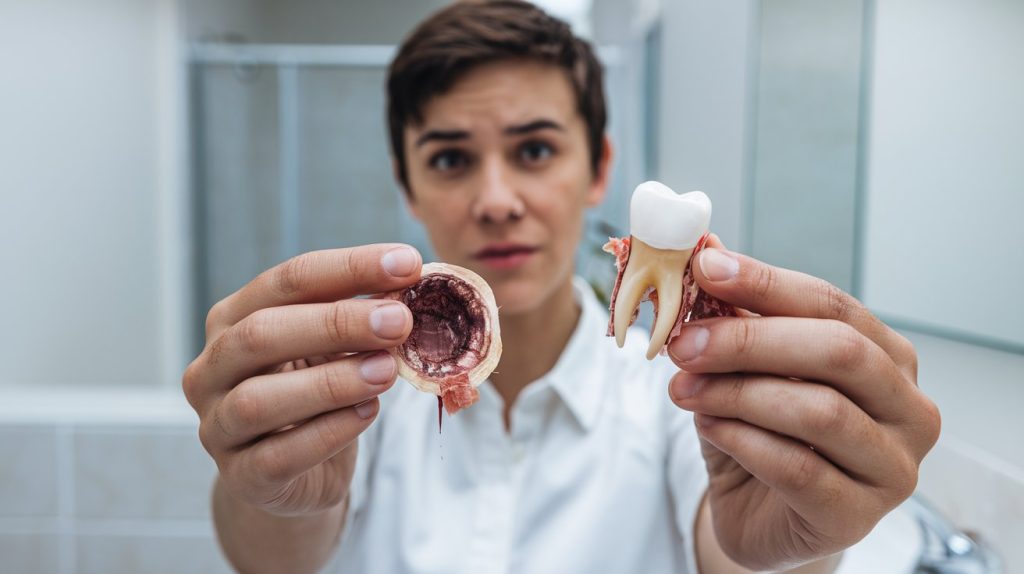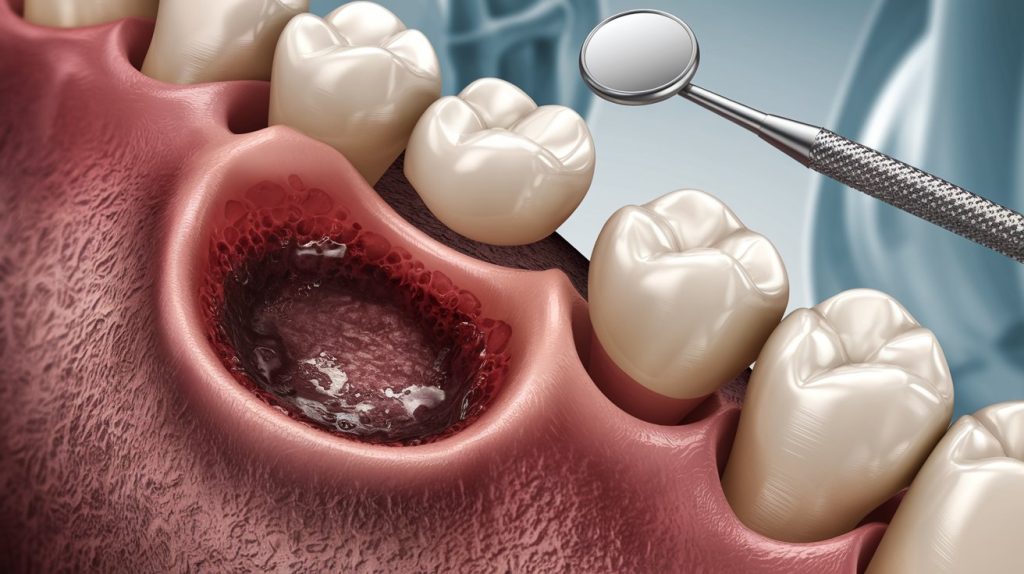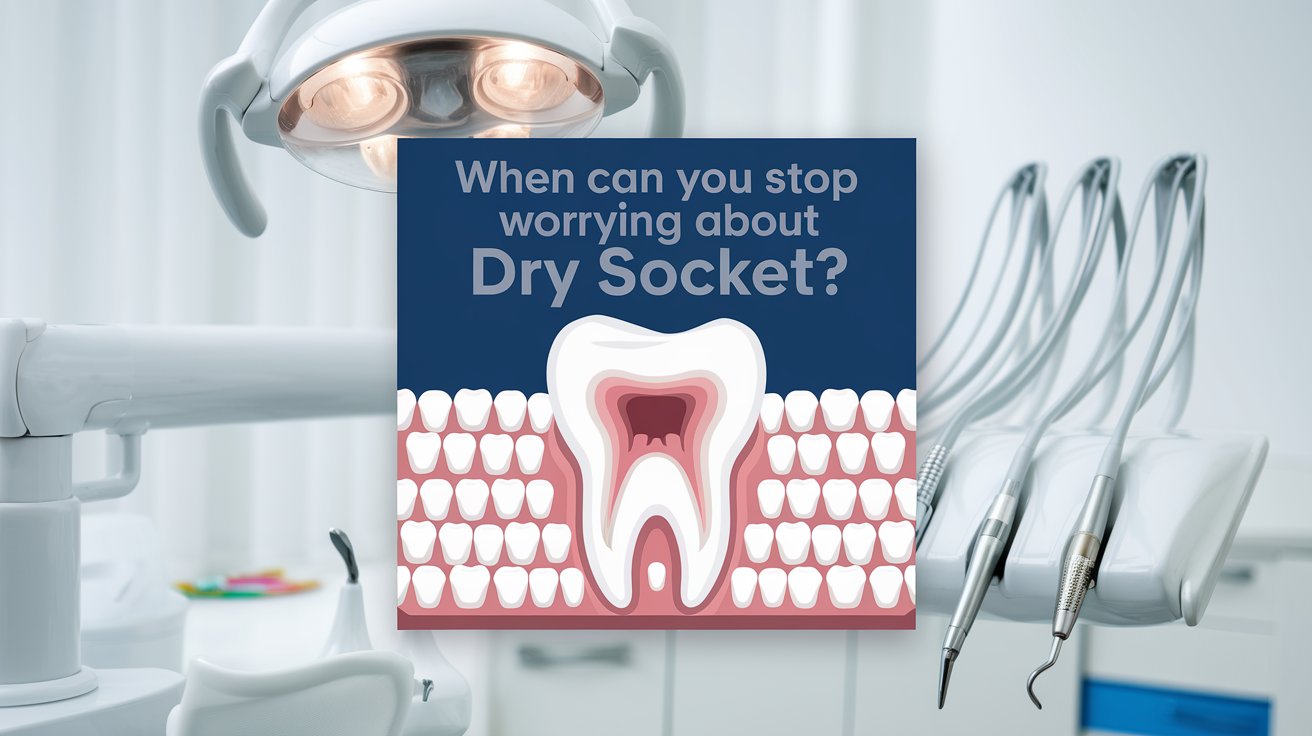Table of Contents
If you had a tooth extracted lately, you might be wondering, “When can you stop being concerned about dry socket?” This shared concern can cause a lot of anxiety after dental surgery, but knowing the signs and timeline of healing can help ease your mind. In this article When Can You Stop Worrying About Dry Socket, we’ll walk you through everything you need to know about dry sockets, including what they are, how to prevent them, and, most importantly, when you can finally stop worrying and find peace. When Can You Stop Worrying About Dry Socket? Understanding this information will help you recover smoothly and with confidence.
What Is a Dry Socket? When will dry socket become less of a concern?

When Can You Stop Worrying About Dry Socket? Alveolar osteitis, often known as dry socket, is an excruciating condition that can develop following tooth extraction. It happens when the blood clot forms in the socket where the tooth was removed, and it either dissolves or dislodges before the wound fully recovers. This leaves the underlying bone and nerves exposed, leading to significant discomfort.
When Can You Stop Worrying About Dry Socket? A dry socket is most common after removing wisdom teeth but can occur with any tooth extraction. While the condition is painful, it’s important to remember that it’s relatively rare and treatable.
How to Recognize Dry Socket Symptoms
When Can You Stop Worrying About Dry Socket? Recognizing the symptoms of dry socket early can help you seek treatment quickly and avoid prolonged pain. Common symptoms include:
Intense Pain After Tooth Extraction
The most noticeable symptom of a dry socket is severe pain that typically starts a few days after the extraction. This pain may radiate to your ear, eye, temple, or neck on the same side as the extraction.
Visible Bone in the Socket
If bone can be seen in the socket where the tooth was removed, this is a clear sign of a dry socket. The absence of a blood clot in the extraction site is also an indicator.
Unpleasant Taste or Odor
Another symptom of a dry socket is a foul taste or smell from the extraction site. This occurs due to food debris and bacteria collecting in the exposed socket.
Also read: Can You Eat After Wisdom Teeth Removal: Essential Tips for Recovery
When Can You Stop Worrying About Dry Socket Critical Timeline
One of the most common questions after a tooth extraction is, “When can you stop worrying about dry socket?”. There is a varied timescale for each person to start worrying about this matter, but generally speaking:
The First 24 Hours: Crucial Clot Formation
The first 24 hours after your tooth extraction are critical for clot formation. It’s essential to follow your dentist’s dentist’s carefully during this time. Avoid rinsing your mouth, drinking through a straw, or smoking, as these actions can dislodge the clot and lead to a dry socket.
Days 2 to 3: Monitoring for Symptoms
The risk of dry sockets is highest around the second or third-day post-extraction. If you’ve made it to day three without severe pain, you’ll likely be aware. However, continue to monitor the area closely for any changes.
Days 4 to 7: Entering the Safe Zone
By the fourth day, most people can begin to relax a bit. The risk of developing a dry socket decreases significantly as the extraction site starts to heal. By the end of the first week, you can typically stop worrying about dry sockets altogether, especially if you haven’t experienced any symptoms.
After One Week: Enjoying Peace of Mind
After one week, the chances of developing a dry socket are minimal. If your pain is subsiding and there’s no exposed bone, you can breathe easy and shift your focus to the final stages of healing.
Preventing Dry Socket: Essential Tips for a Smooth Recovery
When Can You Stop Worrying About Dry Socket? While dry sockets can be a concern, several steps can be taken to prevent them and ensure a smooth recovery after tooth extraction.
Follow Your Dentist’s
Your dentist will provide specific aftercare instructions, crucial for preventing dry sockets. These include cleaning your mouth, avoiding foods, and managing pain.
Avoid Straws and Smoking
Sucking actions, such as drinking through a straw or smoking, can dislodge the blood clot from the socket. Doing these activities for at least a week after your extraction is best.
Eat Soft Foods
For the first few days after your extraction, stick to soft foods to avoid disturbing the clot. Mashed potatoes, yogurt, and soups are healthy choices.
Keep the Area Clean
Start gently rinsing your mouth with a saltwater solution 24 hours after your extraction. This helps keep the area clean without disturbing the clot.
What to Do If You Suspect Dry Socket

When Can You Stop Worrying About Dry Socket? Despite your best efforts, dry sockets can still occur. If you suspect you have it, here’s what we should do:
Contact Your Dentist Immediately
If you experience severe pain or notice any other symptoms of dry socket, contact your dentist immediately. They may recommend a special dressing to protect the exposed area and help relieve pain.
Pain Management
Over-the-counter pain medications can help manage the pain until you see your dentist. In some cases, your dentist may prescribe more potent pain relief.
Follow-Up Appointments
After treatment, follow-up appointments may be necessary to ensure the area is healing correctly. Keep these appointments to avoid complications.
So, when can you stop worrying about dry socket? For most people, the answer is about a week after the extraction, once the site has started to heal and the risk has passed. Following your dentist’s dentist’s and being aware of the symptoms can significantly reduce your chances of developing a dry socket. With the proper care, you can find peace of mind and focus on healing without the fear of this painful condition. Remember, the first few days are the most critical, but with proper care, you can navigate this period smoothly and enjoy a worry-free recovery.

